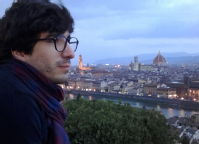 Federico Testa obtained his Ph.D. in Philosophy at the University of Warwick and Monash University (Australia). He has been a Postgraduate Fellow at the European University Institute (Italy), as well as an Early Career Fellow at the Institute of Advanced Study of the University of Warwick. He is a Postdoctoral Research Fellow (“Young Talent Abroad”) at the Pontifical Catholic University of Rio de Janeiro (Brazil).
Federico Testa obtained his Ph.D. in Philosophy at the University of Warwick and Monash University (Australia). He has been a Postgraduate Fellow at the European University Institute (Italy), as well as an Early Career Fellow at the Institute of Advanced Study of the University of Warwick. He is a Postdoctoral Research Fellow (“Young Talent Abroad”) at the Pontifical Catholic University of Rio de Janeiro (Brazil).
His current research has two main axes:
The first explores the field of biopolitics and the concept of life, especially the notions of norm and normativity in the works of Michel Foucault and Georges Canguilhem. His attempt is to read Foucault’s work from the perspective of Canguilhem’s notions of norm and normativity. This framework allows him to understand the continuities between different moments of Foucault’s research, mobilising the notion of norm in order to understand both the functioning of power over life and modern governmental technologies, on the one hand, and the relation to norms mobilised in the creation of ways of life and the government of the self, on the other.
The second axis consists in research and translation in the field of ancient – especially Hellenistic – philosophy and its modern and contemporary readings and receptions. He is preparing a critical edition and translation of Jean Marie Guyau’s La morale d’Épicure (co-edited with Keith Ansell-Pearson) and, together with Matthew Sharpe, he has translated and edited Pierre Hadot’s Selected essays.
He hold a Master’s degree in Philosophy, with a dissertation on Michel Foucault and the History of Madness. He also holds a Master’s degree in History of Art (Art Theory and Criticism), with a thesis on the relations between the cultural concept of madness and artistic creation. He has previously worked, taught and published on aesthetics, art history, art theory and criticism.
As a lecturer and tutor, He worked at Deakin University (Australia), Monash University (Australia), as well as in different institutions in Brazil. He has teaching experience in the history of philosophy, social and political theory and aesthetics.
From 2016 to 2018, he worked as a Research Assistant at Macquarie University (Australia).
In 2017 – 2018, he was a Postgraduate Fellow (AEUIFAI) at the Department of History and Civilisation of the European University Institute (Italy), where he co-organised the workshop “Modern Readings of Epicureanism: Political Receptions and the Politics of Reception”.
